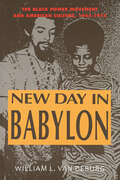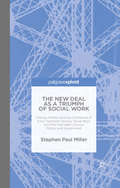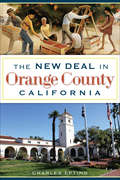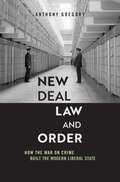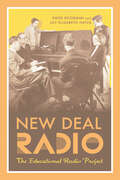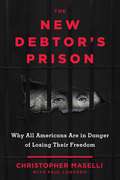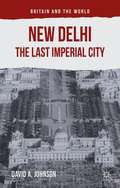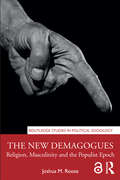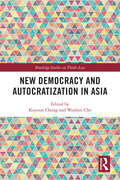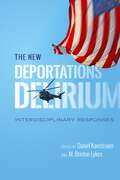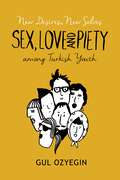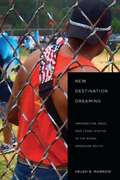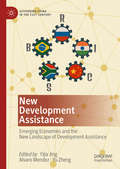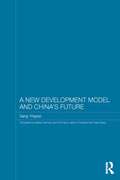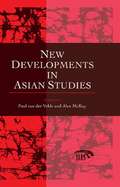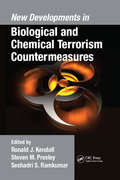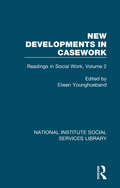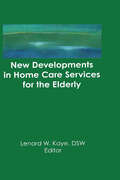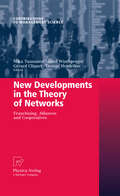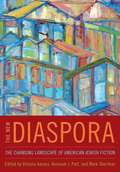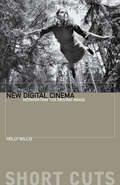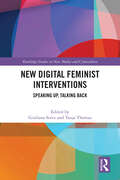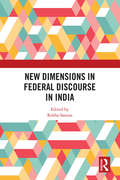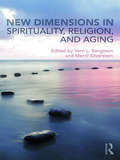- Table View
- List View
New Day in Babylon: he Black Power Movement and American Culture, 1965–1975
by William L. Van DeburgThe most comprehensive account available of the rise and fall of the Black Power Movement and of its dramatic transformation of both African-American and larger American culture. With a gift for storytelling and an ear for street talk, William Van Deburg chronicles a decade of deep change, from the armed struggles of the Black Panther party to the cultural nationalism of artists and writers creating a new aesthetic. Van Deburg contends that although its tactical gains were sometimes short-lived, the Black Power movement did succeed in making a revolution—one in culture and consciousness—that has changed the context of race in America. "New Day in Babylon is an extremely intelligent synthesis, a densely textured evocation of one of American history's most revolutionary transformations in ethnic group consciousness."—Bob Blauner, New York Times Winner of the Gustavus Myers Center Outstanding Book Award, 1993
The New Deal as a Triumph of Social Work: Frances Perkins and the Confluence of Early Twentieth Century Social Work with Mid-Twentieth Century Politics and Government
by S. MillerThe New Deal as a Triumph of Social Work concerns the 'hand' the New Deal plays from the perspective of early American History in which government and business cooperation is assumed and economic rights are addressed collectively whereas political rights are considered individually. The New Deal reconfigures this 'ratio' of rights by folding 'social work' into the aims of government. Miller describes the vital part Frances Perkins and her personal history play in this development.
The New Deal in Orange County, California
by Charles EptingThis historical tour explores how FDR&’s domestic programs helped revitalize a region devastated by natural disasters and the Great Depression. While many people are familiar with the New Deal&’s sweeping initiatives, few have a nuanced sense of what this &“alphabet soup&” of organizations actually did on a local level. In this fascinating book, historian Christopher Epting looks at the various New Deal projects undertaken in Orange County, showing how they met the myriad needs of its struggling communities. Unpredictably harsh elements wreaked havoc in Orange County during the Great Depression. The Long Beach earthquake of 1933 and the 1938 Santa Ana River flood took numerous lives, decimated buildings and destroyed much of the county's namesake citrus industry. In response, Orange County received federal public aid through the Works Progress Administration, Civilian Conservation Corps and other agencies. Epting reveals their efforts in this tour of the buildings, bridges, harbors, trails, libraries, highways and other infrastructure gains—many still in use—that were revitalized by President Roosevelt&’s New Deal.
New Deal Law and Order: How the War on Crime Built the Modern Liberal State
by Anthony GregoryA historian traces the origins of the modern law-and-order state to a surprising source: the liberal policies of the New Deal.Most Americans remember the New Deal as the crucible of modern liberalism. But while it is most closely associated with Roosevelt’s efforts to end the Depression and provide social security for the elderly, we have failed to acknowledge one of its most enduring legacies: its war on crime. Crime policy, Anthony Gregory argues, was a defining feature of the New Deal. Tough-on-crime policies provided both the philosophical underpinnings and the institutional legitimacy necessary to remake the American state.New Deal Law and Order follows President Franklin Roosevelt, Attorney General Homer Cummings, and their war on crime coalition, which overcame the institutional and political challenges to the legitimacy of national law enforcement. Promises of law and order helped to manage tensions among key Democratic Party factions—organized labor, Black Americans, and white Southerners. Their anticrime program, featuring a strengthened criminal code, an empowered FBI, and the first federal war on marijuana, was essential to the expansion of national authority previously stymied on constitutional grounds. This nascent carceral liberalism both accommodated a redoubled emphasis on rehabilitation and underwrote a massive wave of prison construction across the country. Alcatraz, an unforgiving punitive model, was designed to be a “symbol of the triumph of law and order.” This emergent security state eventually transformed both liberalism and federalism, and in the process reoriented the terms of US political debate for decades to come.
New Deal Radio: The Educational Radio Project
by David Goodman Joy Elizabeth HayesNew Deal Radio examines the federal government's involvement in broadcasting during the New Deal period, looking at the U.S. Office of Education's Educational Radio Project. The fact that the United States never developed a national public broadcaster, has remained a central problem of US broadcasting history. Rather than ponder what might have been, authors Joy Hayes and David Goodman look at what did happen. There was in fact a great deal of government involvement in broadcasting in the US before 1945 at local, state, and federal levels. Among the federal agencies on the air were the Department of Agriculture, the National Park Service, the Works Progress Administration (WPA) and the Federal Theatre Project. Contextualizing the different series aired by the Educational Radio Project as part of a unified project about radio and citizenship is crucial to understanding them. New Deal Radio argues that this distinctive government commercial partnership amounted to a critical intervention in US broadcasting and an important chapter in the evolution of public radio in America.
The New Debtors' Prison: Why All Americans Are in Danger of Losing Their Freedom
by Paul Lonardo Christopher B. MaselliDebtors’ prisons might sound like something out of a Dickens novel, but what most Americans do not realize is that they are alive and well in a new and startling form. Today more than 20 percent of the prison population is incarcerated for financial reasons such as failing to pay a fine. This alarming trend not only affects the poor, who are hit particularly hard, but also ensnares the millions of self-identified middle-class people who are struggling to make ends meet. All across the country people are being fined and even imprisoned for offenses as small as delinquency on student debt or an unpaid parking ticket. However, there is an insidious undercurrent to these practices that the average person might not realize. Many counties depend on a steady supply of citizens to pay fines and court costs in order to make their budgets. Minor vehicle infractions, by design, can rack up hundreds of dollars in charges that go straight to the city’s coffers. Combine this with the fact that many middle-class people cannot handle an unexpected $400 expense and the general lack of awareness about the risk for being repeatedly jailed for failure to pay court costs, probation, and even per day charges for being in jail and you get an endless cycle of men and women either in debt or in prison for debt. While shocking to some, this system makes up today’s debtors’ prisons. In The New Debtors’ Prison, Christopher Maselli draws from his personal knowledge of the criminal justice system based on his experience on both sides of the prison walls as an attorney as well as a former inmate, to take a hard look at our modern prison system that systematically targets the poor and vulnerable of our society in order to fund the prison-industrial complex.
New Delhi: The Last Imperial City
by David A. JohnsonJohnson provides an historically rich examination of the intersection of early twentieth-century imperial culture, imperial politics, and imperial economics as reflected in the colonial built environment at New Delhi, a remarkably ambitious imperial capital built by the British between 1911 and 1931.
The New Demagogues: Religion, Masculinity and the Populist Epoch (Routledge Studies in Political Sociology)
by Joshua M. RooseFocused on the emergence of US President Donald Trump, the United Kingdom’s departure from the European Union, and the recruitment of Islamic State foreign fighters from Western Muslim communities, this book explores the ways in which the decay and corruption of key social institutions has created a vacuum of intellectual and moral guidance for working people and deprived them of hope and an upward social mobility long considered central to the social contract of Western liberal democracy. Examining the exploitation of this vacuum of leadership and opportunity by new demagogues, the author considers two important yet overlooked dimensions of this new populism: the mobilization of both religion and masculinity. By understanding religion as a dynamic social force that can be mobilized for purposes of social solidarity and by appreciating the sociological arguments that hyper-masculinity is caused by social injury, Roose considers how these key social factors have been particularly important in contributing to the emergence of the new demagogues and their followers. Roose identifies the challenges that this poses for Western liberal democracy and argues that states must look beyond identity politics and exclusively rights-based claims and, instead, consider classical conceptions of citizenship.
New Democracy and Autocratization in Asia (Routledge Studies on Think Asia)
by Kuyoun Chung and Wonbin ChoThis book examines the quality of democracies in Asia and determines why current democracies—especially during the so-called “new normal” era following the 2008 financial crisis—have become less stable and less resilient to increasing authoritarianism. Based on the assumption that the concept of democracy consists of three elements—procedure (participation, competition, and distribution of power); effectiveness (representation, accountability, and responsiveness); and performance (social welfare, inequality, and trust)—the contributors to this book determine which elements are responsible for diverging trajectories within the Asian democratic recession. Examining South Korea, Japan, Taiwan, Singapore, Vietnam, Indonesia, India, Myanmar, and China, the authors employ different research methods—quantitative, comparative, or individual case studies—to explore the conditions under which democratic rules and norms erode over time, and which type of governance is preferred by citizens in this region as an ideal type. The book puts forward the argument that a procedure-oriented concept of democracy is not sufficient for understanding the source of democratic recession and develops a new concept of “new democracy” based on procedure, effectiveness, and performance. It also demonstrates to what extent the experience changes and how the countries respond to these changes. A novel contribution on the state of democracy in Asia written by experts from the region, this book will be of interest to academics in the field of political science, especially comparative politics and international relations, regional study of East and Southeast Asia, sociology, public policy, economics, and social science methods. Also, this book will appeal to think tanks and policy-oriented researchers.
The New Deportations Delirium: Interdisciplinary Responses (Citizenship and Migration in the Americas #7)
by Daniel Kanstroom M. Brinton LykesSince 1996, when the deportation laws were hardened, millions of migrants to the U.S., including many long-term legal permanent residents with “green cards,” have experienced summary arrest, incarceration without bail, transfer to remote detention facilities, and deportation without counsel—a life-time banishment from what is, in many cases, the only country they have ever known. U.S.-based families and communities face the loss of a worker, neighbor, spouse, parent, or child. Many of the deported are “sentenced home” to a country which they only knew as an infant, whose language they do not speak, or where a family lives in extreme poverty or indebtedness for not yet being able to pay the costs of their previous migration. But what does this actually look like and what are the systems and processes and who are the people who are enforcing deportation policies and practices? The New Deportations Delirium responds to these questions.Taken as a whole, the volume raises consciousness about the complexities of the issues and argues for the interdisciplinary dialogue and response. Over the course of the book, deportation policy is debated by lawyers, judges, social workers, researchers, and clinical and community psychologists as well as educators, researchers, and community activists. The New Deportations Delirium presents a fresh conversation and urges a holistic response to the complex realities facing not only migrants but also the wider U.S. society in which they have sought a better life.
New Desires, New Selves: Sex, Love, and Piety among Turkish Youth
by Gul OzyeginAs Turkey pushes for its place in the global pecking order and embraces neoliberal capitalism, the nation has seen a period of unprecedented shifts in political, religious, and gender and sexual identities for its citizens. In New Desires, New Selves, Gul Ozyegin shows how this social transformation in Turkey is felt most strongly among its young people, eager to surrender to the seduction of sexual modernity, but also longing to remain attached to traditional social relations, identities and histories. Engaging a wide array of upwardly-mobile young adults at a major Turkish university, Ozyegin links the biographies of individuals with the biography of a nation, revealing their creation of conflicted identities in a country which has existed uneasily between West and East, modern and traditional, and secular and Islamic. For these young people, sexuality, gender expression, and intimate relationships in particular serve as key sites for reproducing and challenging patriarchy and paternalism that was hallmark of earlier generations. As Ozyegin evocatively shows, the quest for sexual freedom and an escape from patriarchal constructions of selfless femininity and protective masculinity promise both personal transformations and profound sexual guilt and anxiety. A poignant and original study, New Desires, New Selves presents a snapshot of cultural change on the eve of rapid globalization in the Muslim world.
New Destination Dreaming
by Helen B. MarrowNew York, Chicago, and Los Angeles have long been shaped by immigration. These gateway cities have traditionally been assumed to be the major flashpoints in American debates over immigration policy—but the reality on the ground is proving different. Since the 1980s, new immigrants have increasingly settled in rural and suburban areas, particularly within the South. Couple this demographic change with an increase in unauthorized immigrants, and the rural South, once perhaps the most culturally and racially "settled" part of the country, now offers a window into the changing dynamics of immigration and, more generally, the changing face of America. New Destination Dreaming explores how the rural context impacts the immigrant experience, how rapid Hispanic immigration influences southern race relations, and how institutions like schools and law enforcement agencies deal with unauthorized residents. Though the South is assumed to be an economically depressed region, low-wage food processing jobs are offering Hispanic newcomers the opportunity to carve out a living and join the rural working class, though this is not without its problems. Inattention from politicians to this growing population and rising black-brown tensions are both factors in contemporary rural southern life. Ultimately, Marrow presents a cautiously optimistic view of Hispanic newcomers' opportunities for upward mobility in the rural South, while underscoring the threat of anti-immigrant sentiment and restrictive policymaking that has gripped the region in recent years. Lack of citizenship and legal status still threatens many Hispanic newcomers' opportunities. This book uncovers what more we can do to ensure that America's newest residents become productive and integrated members of rural southern society rather than a newly excluded underclass.
New Development Assistance: Emerging Economies and the New Landscape of Development Assistance (Governing China in the 21st Century)
by Yu Zheng Yijia Jing Alvaro MendezThis book explores the changing face of development assistance. China's One Belt, One Road development program is the largest international investment scheme in history, surpassing the Marshall Plan by an order of magnitude. In 2017, a group of top scholars from Fudan, the London School of Economics, and other institutions like the Institute of Development Studies, Australian National University, and World Bank gathered to share findings and ideas about the nature of New Development Assistance. A compilation of their findings, this book will be of interest to NGOs, policymakers, and academics.
A New Development Model and China's Future (Routledge Studies on the Chinese Economy)
by Deng YingtaoThe need for China to find a new, environmentally sustainable development path is accepted widely among Chinese scholars and policy makers. This book makes available for the first time to an English–speaking audience Deng Yingtao's ground-breaking book New Development Model and China’s Future. Published in 1991, the book was far ahead of its time. Deng subjects the development model of the high income countries to rigorous analysis and explores the environmental implications of China following this model. His clear conclusion is that the carrying capacity of the physical environment and nature is limited, that economic and social development should not exceed the carrying capacity of resources, and that China should not adopt the western development path. Based on insights from economics, engineering and human psychology, the book analyses the environmental impact of the current western development model, demonstrates the catastrophic impact this would have in terms of China's own development and in terms of China's relationship with the world, and argues that China's rich intellectual and scientific tradition will allow Chinese people to play a central role in finding the solution to the profound environmental and development challenges the world currently faces.
New Developments in Asian Studies
by VanFirst published in 1998. Routledge is an imprint of Taylor & Francis, an informa company.
New Developments in Biological and Chemical Terrorism Countermeasures
by Ronald J. Kendall; Steven M. Presley; Seshadri S. RamkumarA science-based text, New Developments in Biological and Chemical Terrorism Countermeasures presents research that addresses the growing threat of chemical and biological terrorism as well as the need for improvements in the implementation of countermeasures. This new textbook building upon Advances in Biological and Chemical Terrorism Countermeasu
New Developments in Casework: Readings in Social Work, Volume 2 (National Institute Social Services Library)
by Eileen YounghusbandOriginally published in 1966, this book gives examples of the most advanced thought about casework by well-known writers in England and the United States at the time. The ground covered includes: the use of some current sociological theory in casework; analysis of the interpersonal relationships in casework; new thought about the appropriate use of authority with people whose own internal controls are weak and unreliable; and recent advances in understanding and working with people who respond to action more easily than to words. These articles by well-known authorities illustrate the increased range of insight and skill required of modern caseworkers, and at the same time are highly readable, conveying complex ideas in language refreshingly free from jargon.
New Developments in Home Care Services for the Elderly: Innovations in Policy, Program, and Practice
by Lenard W KayeThis anthology responds to the recurring call for quality in home care service provision. It presents to agency administrators, managers, supervisors, and front line service providers a set of the most up-to-date policy, program, and practice developments in the field. Each contributor to New Developments in Home Care Services for the Elderly explores issues of client/staff diversity and the challenges associated with working with clients grappling with disabling conditions.Contributors in New Developments in Home Care Services for the Elderly explore issues of client/staff diversity and the challenges associated with working with clients grappling with various disabling conditions. Topics addressed include: alternative organizational models in home care the importation of high technology services into the home legal and ethical issues in home health care counseling homebound clients and their families clinical assessment tools and packages case management and the home care client home care entitlements and benefits evaluating and monitoring the effectiveness of in-home care marketing home health care services home care service experiences in other countriesNew Developments in Home Care Services for the elderly covers a continuum of care ranging from housekeeping services to self-care education, teaching, and training services to nursing and medically related services. Consequently, the information contained within this volume is of immediate relevance to a multidisciplinary audience having both direct (field) and indirect (office) service responsibilities in the home care organization. Social workers, nurses, business administrators, and public health professionals will find this an invaluable guide for providing effective home care services.
New Developments in the Theory of Networks
by Gérard Cliquet Mika Tuunanen George Hendrikse Josef WindspergerThe theory of networks aims at developing theoretical views on the design and management of alliances, franchise chains, licensing, joint ventures, cooperatives, and venture capital relations. The current trend in economics and management of networks is twofold: First there is a strong tendency toward application of theoretical approaches developed both in organizational economics, strategic management and organization theory. The second trend refers to the development of more integrative views on networks. Especially, combining organizational economics, strategic management and relational views on networks are very promising research directions. Starting from this status of research, the current book emphasizes network research as a theory-driven field by offering new perspectives on contract design, decision and ownership rights, value creation, knowledge management and the role of social capital in franchising networks, alliances and cooperatives.
The New Diaspora: The Changing Landscape of American Jewish Fiction
by Mark Shechner Avinoam J. Patt Victoria AaronsThe Edward Lewis Wallant Award was founded by the family of Dr. Irving and Fran Waltman in 1963 and is supported by the University of Hartford's Maurice Greenberg Center for Judaic Studies. It is given annually to an American writer, preferably early in his or her career, whose fiction is considered significant for American Jews. In The New Diaspora: The Changing Landscape of American Jewish Fiction, editors Victoria Aarons, Avinoam J. Patt, and Mark Shechner, who have all served as judges for the award, present vital, original, and wide-ranging fiction by writers whose work has been considered or selected for the award. The resulting collection highlights the exemplary place of the Wallant Award in Jewish literature. With a mix of stories and novel chapters, The New Diaspora reprints selections of short fiction from such well-known writers as Rebecca Goldstein, Nathan Englander, Jonathan Safran Foer, Dara Horn, Julie Orringer, and Nicole Krauss. The first half of the anthology presents pieces by winners of the Wallant award, focusing on the best work of recent winners. The New Diaspora's second half reflects the evolving landscape of American Jewish fiction over the last fifty years, as many authors working in America are not American by birth, and their fiction has become more experimental in nature. Pieces in this section represent authors with roots all over the world--including Russia (Maxim Shrayer, Nadia Kalman, and Lara Vapnyar), Latvia (David Bezmozgis), South Africa (Tony Eprile), Canada (Robert Majzels), and Israel (Avner Mandelman, who now lives in Canada). This collection offers an expanded canon of Jewish writing in North America and foregrounds a vision of its variety, its uniqueness, its cosmopolitanism, and its evolving perspectives on Jewish life. It celebrates the continuing vitality and fresh visions of contemporary Jewish writing, even as it highlights its debt to history and embrace of collective memory. Readers of contemporary American fiction and Jewish cultural history will find The New Diaspora enlightening and deeply engaging.
New Digital Cinema: Reinventing the Moving Image (Short Cuts)
by Holly WillisThis introduction to contemporary digital cinema tracks its intersection with video art, music video, animation, print design and live club events to create an avant-garde for the new millennium. It begins by investigating digital cinema and its contribution to innovations in the feature-film format, examining animation and live-action hybrids, the gritty aesthetic of the Dogme 95 filmmakers, the explosions of frames within frames and the evolution of the ‘ambient narrative’ film. This study then looks at the creation of new genres and moving-image experiences as what we know as ‘cinema’ enters new venues and formats.
New Digital Feminist Interventions: Speaking Up, Talking Back (Routledge Studies in New Media and Cyberculture)
by Giuliana Sorce Tanja ThomasThis volume proposes “speaking up” and “talking back” as new theoretical access points for studying feminist activism in digital spaces.Drawing on the influential work of bell hooks, it highlights social justice interventions by feminist/queer/decolonial actors, groups, and collectives who recover the digital as a space for activist organizing and campaigning. In presenting a variety of sociocultural issues, such as gender violence, queer discrimination, or migrant hostility, the book centers empowerment practices in their digital forms, showcasing interventions in Asia, Europe, and the Americas—thereby critically examining the conditions for marginalized voices to speak up, talk back, and be heard in digital publics. In focusing on activist practices, formats, experiences, and scholarship, the contributions analyze many facets of digital feminist contention, including resistance storytelling, hashtag activism, grassroots journalism, or diaspora podcasting.This international and interdisciplinary volume will interest students and scholars of Media and Communication, Social Movements and Activism, Cultural Studies, Gender and Queer Studies, and Race and Ethnicity.
New Dimensions in Federal Discourse in India
by Rekha SaxenaThis book explores hitherto unaddressed dimensions in federalism studies in India. It traces continuities and changes in Indian federalism since independence and especially economic liberalization. Beginning with the 1990s, due to the emergence of multi-party system, coalition governments, change in judicial temper and the onset of privatization and globalization in the economy, there has been a trend towards greater federalization in India. However, in the context of one-party majority in a coalition government since 2014, new aspects have emerged in Indian federalism. The volume engages with several facets of federalism: administrative federalism; environmental and resource federalism; changing dynamics of fiscal federalism; and multi-level governance. With comparative data and case studies across different states of India, it brings together a range of issues, including Article 356 and its dysfunctions; land acquisition; decentralized governance; tribal rights; the roles of central and state governments; concerns regarding Citizenship Amendment Act; recent abrogation of Article 370 and 35 A; Delhi and statehood; climate change; MGNREGA; implementation of ICDS and the cooperative and competitive nature of Indian federalism. Comprehensive and topical, this book will be useful to scholars and researchers of political science, federalism, comparative federal studies, political studies, comparative politics, public administration, governance and development studies. It will also interest policy makers, bureaucrats, government organizations, NGOs, and civil society activists.
New Dimensions in Spirituality, Religion, and Aging: Neglected Aspects Of Human Development
by Vern L Bengtson Merril SilversteinNew Dimensions in Spirituality, Religion, and Aging expands the traditional focus of religiosity to include and evaluate recent research and discoveries on the role of secular spirituality in the aging process. Contributors examine the ways conventional religion and other forms of spirituality affect human development, health and longevity, and they demonstrate how myth-creation enables humans to make meaning in their lives. Taken together, the book points to further research to enhance current knowledge, approaches to care, and social policies.
New Dimensions in Women's Health (5th Edition)
by Linda Lewis Alexander Judith H. Larosa Helaine Bader William Alexander Susan GarfieldNew Dimensions in Women's Health, Fifth Edition, offers a practical approach to understanding the health of women--all races, ethnicities, socioeconomic status, cultures, and orientations. Objective and data-driven, the Fifth Edition provides solid guidance for women to optimize their well-being and prevent illness and impairment. Each chapter of this book comprehensively reviews an important dimension of a woman's general health and examines the contributing epidemiological, historical, psychosocial, cultural/ethical, legal, political, and economic influences. Click here to make your transition to the new edition even easier!
